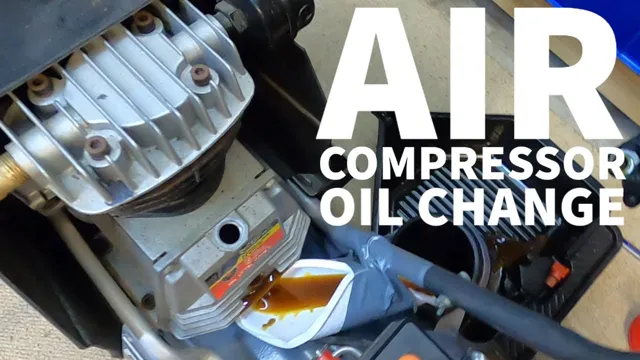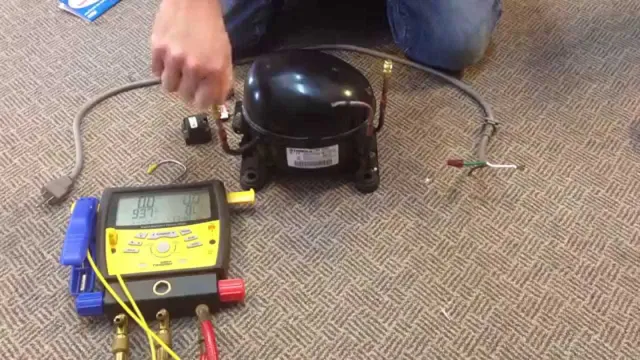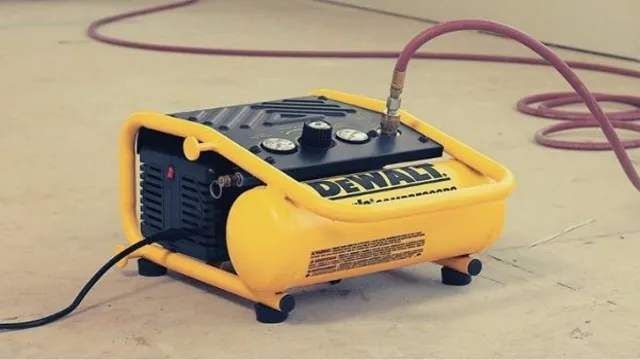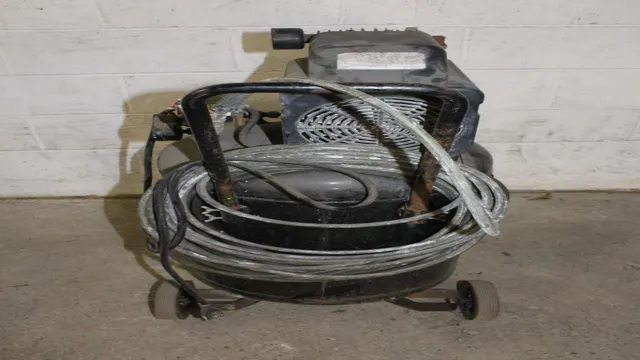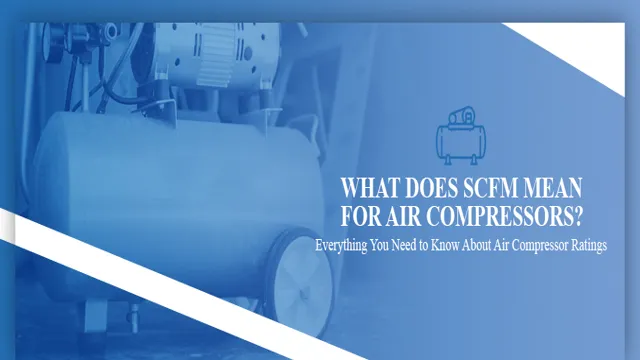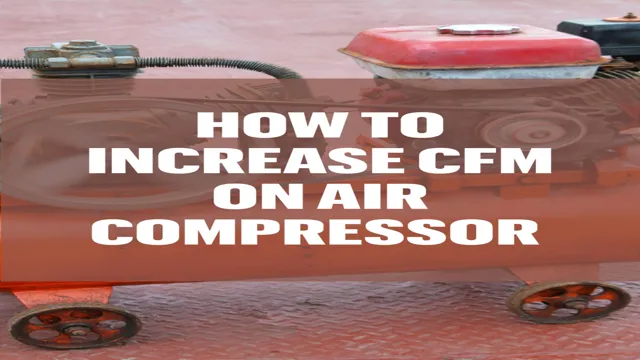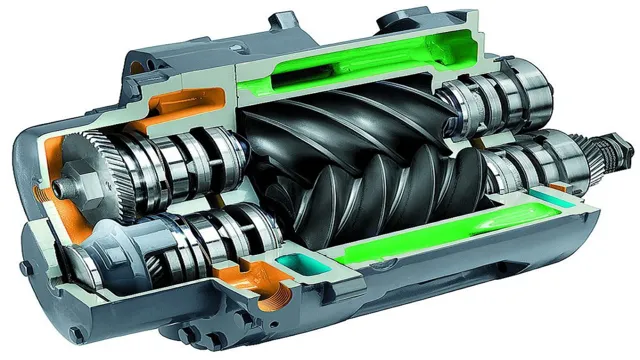Can You Leave an Air Compressor on All the Time? The Pros and Cons of Constant Use
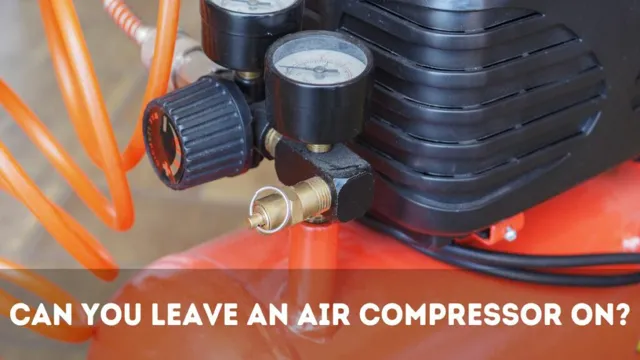
Do you often find yourself leaving your air compressor running all the time, wondering if it’s safe for the machine and for your wallet? Well, it’s a valid concern, especially if you’re frequently using your compressor for extended periods. But the answer isn’t always straightforward. Many factors can affect the safety of leaving your air compressor on, such as usage, maintenance, and the type of compressor you have.
In this post, we’ll explore the ins and outs of keeping your air compressor running, the potential risks and benefits, and how you can ensure your compressor stays in good working order. Let’s dive in!
Understanding Air Compressors
If you’re wondering whether it’s safe to leave an air compressor on all the time, the short answer is: it depends. Some air compressors are built to run continuously, while others are designed to be used intermittently. If you have a continuous-duty compressor, then running it all the time shouldn’t be a problem as long as it’s well-maintained.
However, if your compressor isn’t designed for continuous use, leaving it on all the time can cause it to overheat, which can lead to damage or even a fire. As a general rule, it’s a good idea to turn off your compressor when you’re not using it, or when you’re not going to be in the same room. This not only helps to prevent overheating but also saves energy and extends the life of your compressor.
So, if you have a continuous-duty compressor, feel free to leave it on, but if you’re not sure, it’s better to err on the side of caution and turn it off when you’re not using it.
How do air compressors work?
Air compressors are incredibly useful tools that can be found in many different industries. But have you ever wondered how they work? Essentially, an air compressor takes in air from the atmosphere and compresses it to a higher pressure before storing it in a tank. The compressor achieves this by using a motor to power a piston or a rotary screw that compresses the air.
The pressure of the compressed air can be adjusted based on the needs of the user. This compressed air is then used in a variety of applications, from powering tools and machinery to inflating tires and other objects. It’s important to note that air compressors require regular maintenance to work at their best.
This includes things like changing the oil, cleaning or replacing air filters, and checking for leaks. By understanding how air compressors work, you can better appreciate the important role they play in a variety of industries.
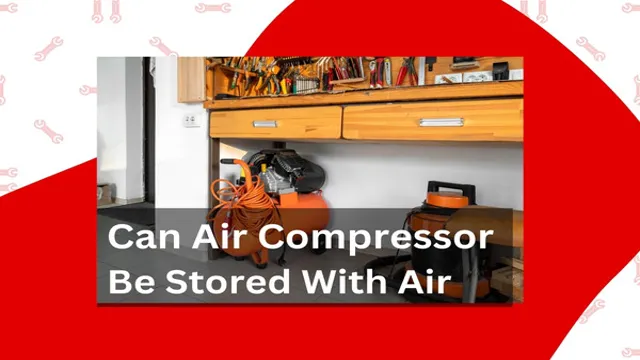
Types of air compressors
Air compressors are devices that convert power into potential energy stored in compressed air. There are various types of air compressors available, each with its own unique features and benefits. The most common types include reciprocating piston air compressors, rotary screw air compressors, centrifugal air compressors, and axial compressors.
Reciprocating piston air compressors are commonly used in home workshops and small businesses for powering air tools. Rotary screw air compressors are better suited for larger applications, such as manufacturing plants and industrial applications, due to their high efficiency and lower noise levels. Centrifugal and axial compressors, on the other hand, are ideal for applications that require a large volume of compressed air, such as power plants and aircraft engines.
Understanding the different types of air compressors is essential for selecting the right one for your specific needs.
Pros and Cons of Leaving an Air Compressor on All the Time
If you’re wondering “can you leave an air compressor on all the time,” the answer is technically yes, but it’s not always the best idea. Leaving an air compressor on all the time can provide convenience but can lead to a shorter lifespan, higher energy bills and potential safety hazards. The constant strain on the motor and components can cause mechanical failure, and the wear and tear can lead to maintenance and replacement costs.
Additionally, leaving the air compressor on all the time means it’s drawing energy even when it’s not in use, resulting in higher electricity costs. Furthermore, leaving an air compressor on all the time poses safety risks, such as overheating and potential fires. While leaving an air compressor on all the time may offer convenience, it’s crucial to weigh the benefits against the potential drawbacks and determine if it’s worth the risk.
Pros: Constant accessibility, consistent pressure
An air compressor is an important tool in many different settings, from industrial workplaces to home workshops. One question that often comes up is whether it’s better to leave the air compressor on all the time or turn it off when not in use. There are definitely pros and cons to each approach.
One of the biggest benefits of leaving the air compressor on is that it ensures constant accessibility. You can always be sure that you have compressed air available whenever you need it. Additionally, the compressor will maintain a consistent pressure level, which can make it easier to get your work done efficiently.
However, there are a few potential downsides as well. One is that leaving the compressor on all the time can put unnecessary wear and tear on the machine, possibly shortening its lifespan. Additionally, it can contribute to higher energy costs if it’s running constantly and not being used at full capacity.
Ultimately, the decision of whether to leave the air compressor on or turn it off will depend on your specific needs and situation.
Cons: Energy consumption, wear and tear
If you’re constantly using your air compressor, it can be tempting to leave it on all the time. However, there are both pros and cons to this decision. On the one hand, leaving your air compressor on means that it’s always ready to go when you need it.
You don’t have to wait for it to warm up or build up pressure. On the other hand, leaving your air compressor on all the time can lead to increased energy consumption and wear and tear on the machine. It’s important to consider the cost of energy and the potential need for repairs when deciding whether or not to leave your air compressor on.
Ultimately, the decision depends on your specific circumstances and usage patterns. If you use your air compressor frequently throughout the day, leaving it on may make sense. However, if you only use it occasionally, it may be better to turn it off when not in use to save energy and extend the life of the machine.
It’s a balancing act between convenience and practicality, and one that only you can decide.
Factors to Consider Before Leaving an Air Compressor on All the Time
If you’re wondering “can you leave an air compressor on all the time?” the answer is yes, but you need to consider a few factors. First, leaving your air compressor on all the time will increase your energy consumption, which means it can be costly. Second, it can be dangerous if you don’t have the right safety measures in place.
If your air compressor is constantly running, it can heat up and cause accidents. Therefore, you need to ensure that your compressor has adequate ventilation to maintain a steady temperature. Third, the lifespan of your compressor can decrease if you leave it on all the time.
This is because the internal parts can wear out faster due to continuous use. To avoid this, it’s recommended to only run the compressor when you need to use it and to store it properly when not in use. In conclusion, while leaving your air compressor on all the time may seem like a convenient option, it’s important to weigh the costs and risks before deciding to do so.
Type of air compressor
Air compressor When it comes to leaving an air compressor on all the time, there are some important factors to consider. One of the most crucial is the type of air compressor you have. Different types of air compressors have different capabilities and limitations, and these can impact your decision about whether or not to keep them running continuously.
For example, rotary screw compressors are designed to run continuously, whereas reciprocating compressors are generally better suited for intermittent use. Additionally, you’ll need to consider the size and power of your compressor, as well as any specific maintenance or safety requirements. Ultimately, the decision to leave your air compressor running all the time will depend on your specific needs and situation, so it’s important to do your research and make an informed decision.
Size of compressor and intended usage
When it comes to air compressors, size does matter, and it’s important to choose the right one for your specific needs. Before leaving your air compressor on all the time, there are a few factors to consider. Firstly, think about the intended usage.
If you plan on using it for heavy-duty industrial work, you will need a larger compressor with a higher CFM (cubic feet per minute) rating. However, if you plan on using it for lighter tasks, a smaller unit will suffice. Secondly, consider the duty cycle of the compressor.
This refers to how long the compressor can operate continuously before it needs a break. Keeping an air compressor on all the time can lead to overheating and damage if it’s not designed for continuous operation. It’s essential that you choose a compressor with an appropriate duty cycle for your intended usage.
In conclusion, before leaving an air compressor on all the time, make sure you’ve chosen the right size and type for your specific needs and that it’s designed for continuous operation if necessary. By doing so, you’ll extend the lifespan of your compressor and ensure its efficiency.
Frequency and duration of use
Before deciding to leave your air compressor on all the time, there are some factors to consider. First of all, it’s important to look at the frequency and duration of use. If you’re using the compressor for short bursts throughout the day, it might make sense to leave it on all the time so it’s always ready when you need it.
On the other hand, if you’re only using it every few hours or just a few times a day, it might be better to turn it off in between uses to save energy and reduce wear and tear on the machine. Additionally, consider the size and type of compressor you have. Larger compressors with more powerful motors can handle being left on for longer periods of time, while smaller compressors may overheat or wear out more quickly if left on continuously.
Ultimately, the decision to leave your air compressor on all the time should be based on your specific needs and circumstances. By taking these factors into account, you can make an informed choice that keeps your machine running smoothly and efficiently.
Tips for Leaving an Air Compressor on All the Time
Many people wonder if they can leave an air compressor on all the time, and the answer is yes, but it’s important to take some precautions to avoid damage. First, make sure the compressor is located in a well-ventilated area and far from heat sources to prevent overheating. It’s also recommended to install a pressure switch that automatically turns off the compressor when it reaches the desired pressure, preventing overloading.
Check the oil levels regularly and change them as necessary. Finally, inspect the motor and other components for signs of wear or damage regularly. Following these tips can help ensure your air compressor runs smoothly and efficiently for a long time.
Regular maintenance and inspection
If you plan on leaving your air compressor on all the time, it’s essential to perform regular maintenance and inspection. First and foremost, check the oil levels daily or at least weekly to ensure they’re where they need to be. Additionally, replace the air filter regularly, usually every three to six months, depending on how frequently you use the compressor.
Another vital aspect is to check for leaks and fix them immediately as leaks cause the compressor to work harder and can lead to costly repairs. Lastly, keep the compressor clean by wiping it down regularly and storing it in a dry location. By following these tips and scheduling regular maintenance, you can prevent potential issues and extend the life of your air compressor.
Invest in energy-efficient models
If you’re leaving your air compressor on all the time, it’s important to invest in an energy-efficient model to save money and reduce your carbon footprint. Look for compressors with variable speed drives (VSD) or energy-saving features like auto shut-off or idle mode. These features will help regulate the amount of energy being used, making it more efficient and cost-effective in the long run.
Additionally, make sure to regularly maintain your compressor by cleaning filters and oiling machinery. By taking these steps, you can ensure a longer lifespan for your compressor and reduce the need for costly repairs. Investing in an energy-efficient model not only benefits your wallet but also helps the environment by reducing energy consumption and greenhouse gas emissions.
So, consider upgrading your compressor today and start reaping the benefits of efficient, cost-effective operation.
Proper ventilation and safety precautions
Proper ventilation is essential when leaving an air compressor on all the time. If you aren’t careful, air compressors can get pretty hot, and the heat could cause a fire or explosion. Ensure you have adequate ventilation in the area where your compressor is located, especially if it’s in a small, confined space.
If you’re using your compressor indoors, make sure there’s a way for fresh air to circulate in the room. You should also be cautious when leaving your compressor running when you’re not around. Always turn it off if you’re leaving the area.
Another safety tip is to keep your compressor far enough away from flammable materials, like gas cans or solvents, to prevent any accidents. Proper ventilation and safety precautions should be taken seriously when operating an air compressor to ensure everyone’s safety, including yourself and those around you.
Conclusion
In conclusion, keeping an air compressor running all the time is like leaving a fridge door open – it might seem convenient in the short term, but in the long run, it’ll be a total energy drain. So, unless you enjoy paying unnecessarily high electricity bills, it’s best to switch off or at least give your compressor a breather between uses. After all, a little bit of rest goes a long way in ensuring that your tools (and wallet) stay in tip-top shape!”
FAQs
1. Is it safe to leave an air compressor running continuously? A: No, it is not safe to leave an air compressor running continuously. It can cause overheating and damage to the compressor. 2. How long can an air compressor stay on before it needs a break? A: An air compressor can stay on for up to 30 minutes before it needs a break to cool down. It is recommended to turn off the compressor after 20 minutes of continuous use. 3. Can an air compressor run overnight? A: It is not recommended to leave an air compressor running overnight as it can overheat, cause damage, and pose a fire hazard. 4. How often should I turn off my air compressor? A: It is recommended to turn off your air compressor after 20 minutes of continuous use and give it a break for at least 10 minutes before using it again. 5. What are the risks of leaving an air compressor on for too long? A: Leaving an air compressor on for too long can result in overheating, damaging the compressor, posing a fire risk, and consuming excessive energy. 6. Can I use an air compressor continuously if it has an automatic shut-off feature? A: Even with an automatic shut-off feature, it is not recommended to use an air compressor continuously. It is important to give it a break and prevent overheating and other risks. 7. Is it better to turn off my air compressor when I’m not using it? A: Yes, it is better to turn off your air compressor when you’re not using it to save energy, prevent overheating and prolong the compressor’s lifespan.

